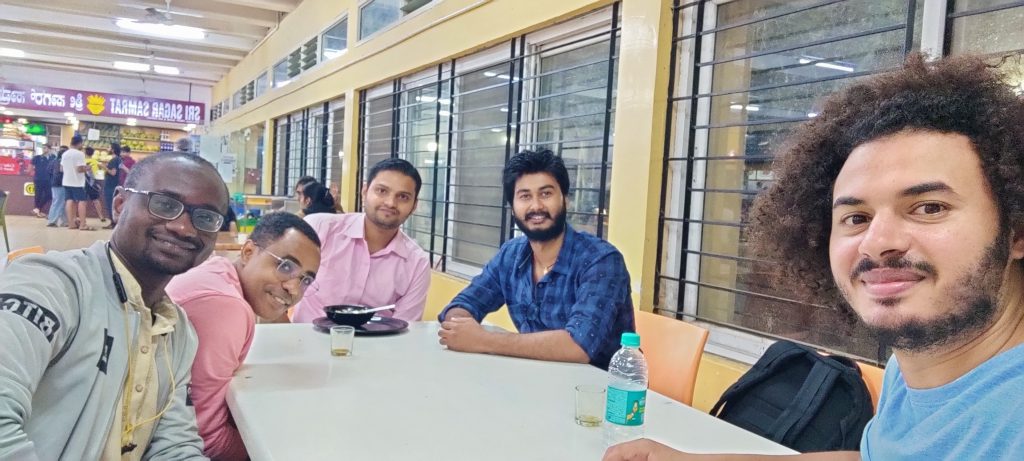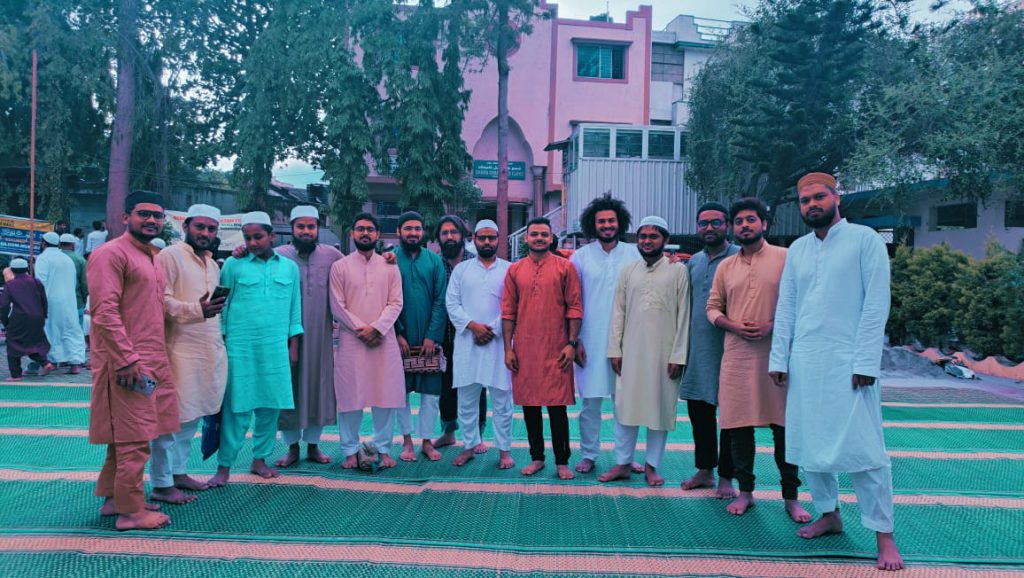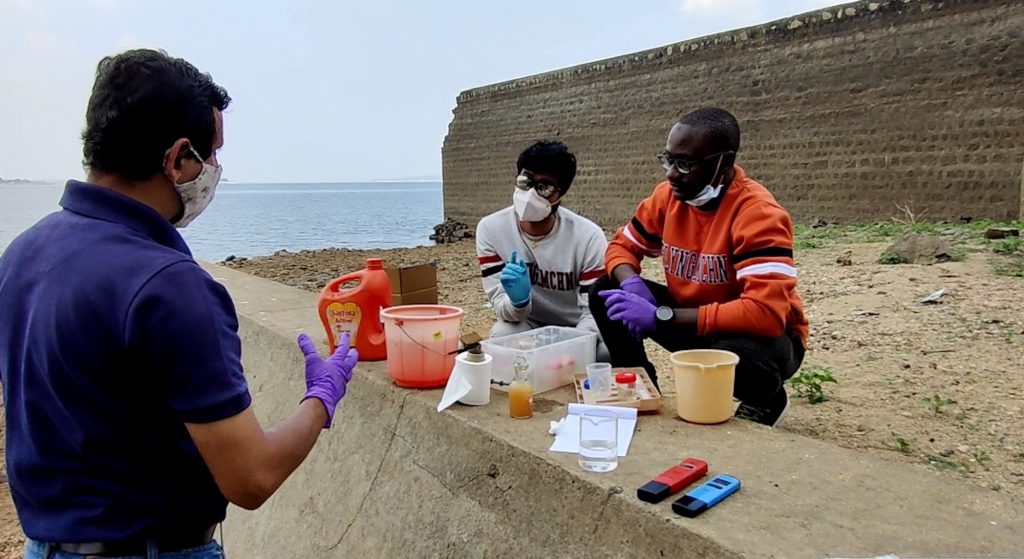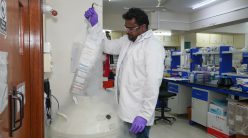The lives and experiences of IISc’s international students

Fourteen years ago, before Fekadu Mihret Geremew came to India for the first time to pursue his Master’s, he had heard a lot about how it was not the ideal place to live. The image he had in mind was a country of traffic congestion, overcrowded streets, and hot weather. But after finishing his Master’s degree and returning home to Ethiopia, he decided to come back to India for a PhD. By this time, his opinion had changed. “[It’s a] beautiful country. It is rich in diversity. People should come and study in India,” says Fekadu, who is currently pursuing his PhD in the Department of Electrical Communication Engineering (ECE) at IISc.
Like Fekadu, every year, many international students come to IISc to pursue their dreams. The Institute has around 65 international students currently enrolled in various academic programmes. Many of the full-time international students are from Nepal, but a few also represent other countries in Asia and Africa. “International students bring diversity and openness to the campus,” says Amita Sneh, International Relations Officer at IISc’s Office of International Relations (OIR). “People from different backgrounds provide a sense of togetherness in a diverse environment.”
While Fekadu got to know about IISc from his Indian friends, Abass Toba Anifowoshe, who was keen on studying zebrafish genetics, had never heard about the Institute until he stumbled upon a social media post. “I applied to one institute in Mumbai called ICAR-Central Institute of Fisheries Education. When I got admission there, I was unable to go because the fees were too high for international students, and I could not afford that. They were not paying a stipend,” says Abass, who comes from Nigeria. He has done his PhD from the Department of Developmental Biology and Genetics (DBG) at IISc, and is awaiting his thesis defence.
Like Abass, Elhassan Ali Fathi Emam too learnt about IISc from social media. “If I do PhD in my country, I will have to pay money, and it takes time, and the truth is that the facilities for research would be limited. Here, it is better, because you can do research and there are funds,” explains Elhassan, a student from Egypt pursuing his PhD in the Department of Microbiology and Cell Biology (MCB), IISc.
IISc has around 65 international students currently enrolled in various academic programmes
Abodh Kumar Jha, another MCB student hailing from Nepal, says, “I came to India in 2012 for my Bachelor’s degree. My elder brother also came to India in 2000 and he studied optometry. He suggested to me that we have many options in India compared to Nepal in terms of education and jobs.”
For international students applying for admission to IISc, their first point of contact is OIR. “We take care of all their queries, from the eligibility criteria to application submission, and coordination with the departments to screen the candidates for interviews,” explains Amita. Once the students are selected, OIR helps them with the admission and visa process by providing the required documents and certificates, and reaching out to the Indian embassies of the respective countries.
OIR continues to assist the students after their arrival. “Once they arrive, we connect them with their home department as well as the academic section,” Amita adds. Except for students of Nepal and Bhutan nationality, other international students need to register themselves with the Foreigner Regional Registration Office (FRRO), a government agency that keeps a track of all international visitors to the country. The registration is mandatory and done annually.
Sometimes, faculty members and students also help the newcomers feel welcome when they first arrive. “My senior from the lab came to the airport to pick me up. So, I didn’t feel very worried,” recalls Bita Afsharinia, a student from Iran pursuing her PhD at the Department of Management Studies, IISc. OIR also makes arrangements for the students’ accommodation and getting them things that they need for their stay, like mattresses, Amita adds.
First impressions
Among the first things that international students get to see is the greenery on campus. “The campus is heaven,” says Bita. “When I entered through the gate, I found that the weather had changed immediately. That was my first time seeing an institute that has a lot of trees,” exclaims Abass. Fekadu and Elhassan also echoed these thoughts.
But the initial amazement soon starts fading when culture shock kicks in. And food is a major contributor. “I am a non-vegetarian, and most of the food I was eating here was vegetarian for the first time in my life, and I fell sick because of that,” recalls Abass. Elhassan and Abass both agree that the amount of spice used in Indian cooking was initially too much for them to handle; Abodh, on the other hand, recalls that the spicy food in B mess reminded him of his hometown in Nepal.
It’s not just the taste of the food, but also the experiences and memories linked to eating that some of them struggled with. “Initially when I was alone eating at home, and not yet joined any mess, I was not able to eat properly, since in Iran, we would always have food together. Therefore, this environmental change led to difficulties in eating and health issues,” says Bita.
Over time, however, the students adapt to the new cuisines. “Now, I am a supporter of Indian food,” says Fekadu. Elhassan has also taken a liking to chai.

Rishi Kesh, Abodh Kumar Jha and Elhassan Ali Fathi Emam, at the
Sarvam food court (Photo courtesy: Abodh Kumar Jha)
Another cultural difference that Abass felt was in the clothes he wore. “I know a lot of eyes are on me whenever I dress in my own way,” he says. Initially, he felt self-conscious, but at one point, people came up to him and appreciated his traditional Nigerian attire, and even clicked photos with him, after which he became more comfortable, he explains.
For Abodh, the culture shock wasn’t as stark. “We had Bollywood movies playing in the theatre. Because of that, I knew how to speak Hindi.”
Linguistic challenges
Despite knowing a bit of Hindi, Abodh admits that he still had to work a lot on his communication skills. For many international students from other countries, language can be a barrier. Abass explains how he could not understand some of the lectures because of the difference in English accents. “Even in the lab meetings, they could not understand my presentation, and sometimes I could not [understand them]. But my professor told me, ‘If you speak slowly, everybody will understand you.’ So, I started adapting to that,” Abass elaborates. Over time, he managed to differentiate between Indian languages, at least enough to know whether someone was speaking Malayalam or Bengali.
Bita, who is a native Persian speaker, had a different experience. Although she found Parsi people in India with whom she could speak in Farsi and even celebrate festivals, she still felt left out in the beginning. “Everyone was talking in different languages, and I was just blank, with certain misunderstandings,” she recalls. Coming from Iran, where English is not spoken widely, she remembers her struggle over the years to develop her English communication skills.
Fekadu says his neighbours helped him improve his communication skills – for example, by teaching him how to talk to cab drivers. Elhassan has already learned bits of Hindi, enough to purchase groceries in local shops, he says.
“Students in IISc have already qualified many exams and they are very good at speaking in English,” says Abodh. “And when I see myself, I am not like them. But IISc has taught me in the past four years, and I like to think that I have enhanced my communication skills with the help of people here.”
Dealing with homesickness
Elhassan says that another challenge he struggled with was homesickness. “I’ve gone home twice since I first came. Whenever I go home and come back, I feel like leaving my PhD and going back there.”
According to Bita, in the beginning, she also suffered from homesickness to the extent that it affected her health. On the other hand, for Fekadu, it was easier because even in his country, his home and the place where he worked were far apart. “For example, if your family is in Bangalore, and you are working in Delhi, you are far away. If I go to my country, I feel the same. As long as I was communicating by phone, it was not a big deal.” Abodh had a similar experience growing up. “I was away from my hometown, because my hometown is in a village, and my mom used to stay in the village. And my father used to stay in the town. So I was away from my mom, even from my childhood,” he reminisces.
Homesickness was even harder to deal with for international students during the pandemic when they could not go home. “I was really scared, and I did not know what I should do, and there was no international flight. And [I thought] if I travel, I might get COVID, then take it to [my family],” Bita remembers.
Homesickness was even harder to deal with for international students during the pandemic
But what has helped some of the students tide over such challenges is staying connected with each other. “We have a WhatsApp group where we have added all the international students, and apart from that we also have a Nepalese group,” says Abodh. “We don’t interact very often, but we are always active if there are any problems. We are like a family here.”
OIR, for its part, is exploring different ways to maintain a bond between international students and faculty on campus. Earlier this year, the office organised its first International Day, spread out over two days. Sports activities like table tennis, badminton, and football, as well as cultural programmes were held, and winners were felicitated by the Director. Informative sessions by FRRO representatives were also hosted to make students aware of the rules and guidelines for foreigners in India. Last year, OIR hosted a Christmas get-together for the international community, where the Director, Chair of OIR and staff members met the international students and visitors and their families, exchanged wishes, and shared festive refreshments.

celebration at a mosque in Bangalore (Photo courtesy:
Elhassan Ali Fathi Emam)
Some of these students also say that they enjoy participating in Indian festivals that bring the campus community together. “My first memory when I came here was the Holi celebration,” recalls Elhassan. “It was nice with all the colours.” Elhassan and Abass also recall how they enjoyed sharing their traditional recipes with Indian students. “I actually went on YouTube, and showed them a lot about our culture, our food,” adds Abass. “And I have cooked for several groups in my apartment.”
Pursuing passions

dam for his PhD work (Photo courtesy: Abass Toba Anifowoshe)
When Abass started his PhD at IISc, he became interested in studying the effect of microplastics on fish in the Cauvery River. To work on this problem, he had to travel often to the Krishna Raja Sagar (KRS) Dam in order to collect samples and interact with local fishermen for two years. When the study – which found that the microplastics were causing skeletal deformities in the fish – was reported in the news, he was delighted. “I was able to see our work published in almost every national newspaper. I have a publication in a reputable journal for the first time; I have achieved what I couldn’t imagine.”
Abass also got a chance to travel to many places in India and Europe to participate in conferences and workshops, with fellowships from the Department of Biotechnology (DBT), and The World Academy of Science (TWAS), Trieste, as well as funding from the General Academic Research Provisions (GARP) at IISc. “I have learned a lot in IISc. Not just learned to do experiments, but to think about doing the experiments. I feel that IISc made me prepared and ready to be a future scientist,” Elhassan says. He is doing his PhD on studying DNA damage and repair mechanisms in Mycobacterium tuberculosis and plans to pursue a postdoc position abroad after this.
Bita says that her PhD supervisor provided a “wonderful” environment for research. “She has given me several work opportunities, trusted me, and supported me in every aspect of life. Whatever I’ve become today, it’s always because of her support and her inspiring personality.” Bita is wrapping her PhD work on investigating how a crisis, like the COVID-19 pandemic, can affect children’s nutrition in India. She has also worked closely with the Akshaya Patra initiative, focusing on environmental factors impacting a child’s dietary requirements. Abodh, too, is about to wrap up his PhD work on identifying Mycobacterium tuberculosis genes that play a crucial role in disease progression. “My professor and my seniors have helped me a lot,” he reminisces. Fekadu is all set to go back and resume his job as a lecturer in Ethiopia after completing his PhD in microwave photonics. “The work culture is interesting in IISc,” he says, adding that his professors gave him a lot of freedom to do his own work.

Abass, however, feels that there are some things that can be done to make the life of international students easier on campus. He strongly believes that an international student representative should be a part of the Students’ Council so that their unique challenges and experiences can be shared with others on campus. Since food and accommodation are a major concern for these students, he suggests that having a separate mess and hostel for international students would help. “Africa is a big continent with 54 countries and a lot of international students are from Africa.” He feels that making provisions for the students to cook their own food would also be helpful. Some steps, like financial support for international travel from their home country and visa processing, would also go a long way, he suggests. Elhassan adds that the Institute and OIR could organise trips across the country that would not only help the students explore India, but also bond with other Indian students.
Despite these challenges, most of the students admitted that there are many things they will miss when they move on from campus. “I feel a belonging at IISc,” says Fekadu. “It will be very difficult to leave this Institute.”
Harsha PM is a PhD student in the Department of Developmental Biology and Genetics (DBG), IISc and a science writing intern at the Office of Communications




